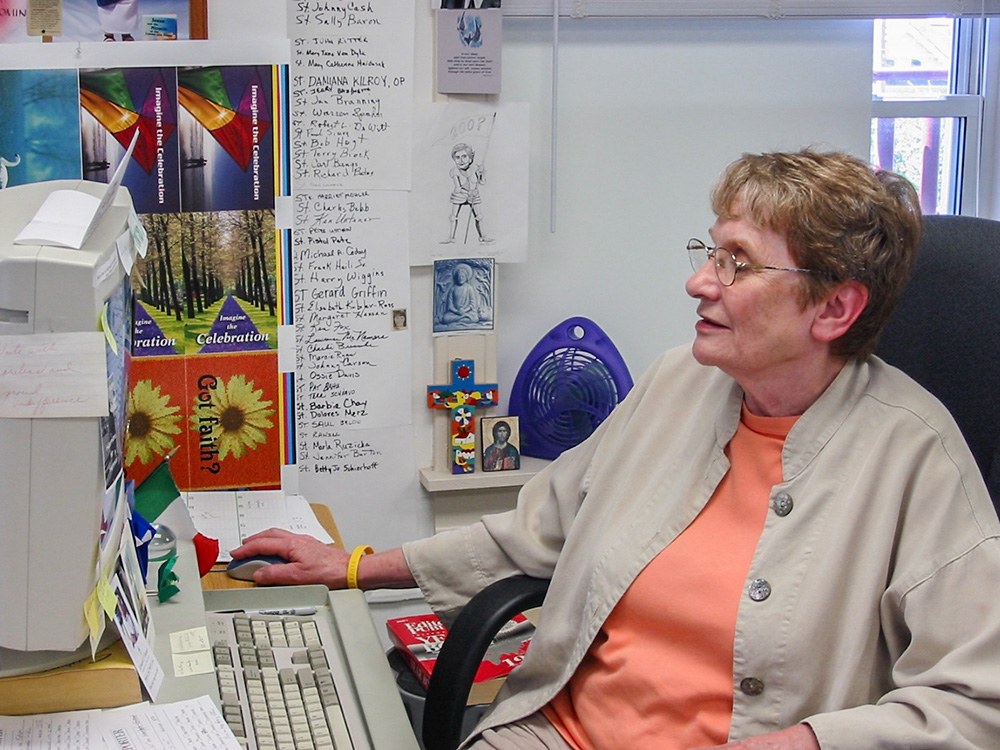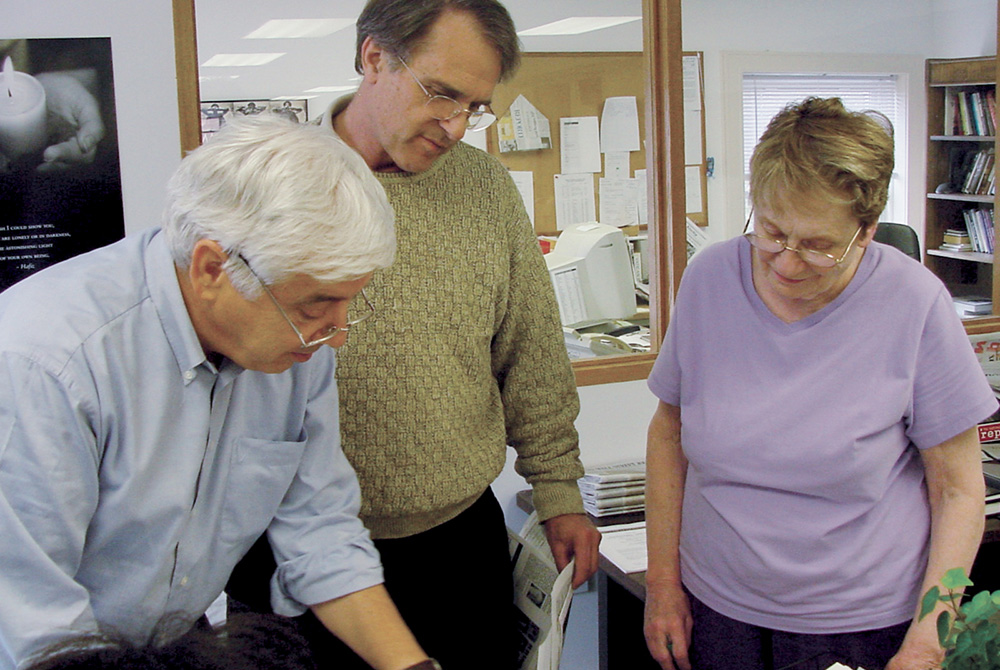
An undated photo of Patty McCarty at her NCR newsroom desk in Kansas City, Missouri. A partial list of saints is on the wall and other icons surround her. (Courtesy of Tom Fox)
Patricia McCarty, who brought faith to life in the National Catholic Reporter newsroom with her desktop prayer tents, votive candles, and ever-lengthening list of locally declared saints taped to a wall, joined the list on Dec. 25, just before dawn on Christmas. She died at home in Kansas City, Missouri, at the age of 93.
Patty understood the power of words, cherished precision, and humbled the most expansive of NCR's big-name writers, adding depth and meaning to their copy before it reached the world. Her meticulous attention to detail ensured that NCR's content was polished and accurate, reflecting her respect for good writing and her commitment to truth. Patty improved NCR with her careful work, accuracy, clarity and love of language.
She was a woman of faith and lived it with a gentleness that was not to be mistaken for her independent and pioneering spirit. Her spirit frequently challenged church norms — it's what saints do. A radiant soul, she navigated the complexities of faith and social justice with grace, humor and unwavering commitment.
She dedicated 15 years of her life to NCR as a copy editor, poetry editor, and writer from 1993 to 2008. Through her work as a poetry editor and her contributions to the "Writer's Desk" column, she shared her insightful perspectives, warm humor and steadfast questions for a more inclusive church.
She was a devoted mother of four and a grandmother of nine. Her children and grandchildren were her pride and joy, and she cherished the time spent with them above all else.
Beyond her NCR professional accomplishments, Patty had a remarkable talent for storytelling through drama. In 1994, she wrote the two-act play "This Other Love," which explored the life of Dorothy Day, who co-founded the Catholic Worker movement in 1933. This play reflected Patty's deep understanding of the complexities of faith and the challenges of living a life guided by strong convictions.
The play examined Day's early struggles with her faith; her complex relationship with her common-law husband, Forster Batterham; and her eventual embrace of Catholicism, which led to a life dedicated to social activism. Patty's portrayal of Day was honest and profoundly human, capturing Day's strength and the doubts and tensions that shaped her extraordinary journey.
Advertisement
For Patty, it was personal. In her youth, she had met Day twice — first at a speaking engagement and later while interviewing her for a student newspaper at Marquette University. Day's message of embracing voluntary poverty resonated profoundly with Patty, who had grown up believing that poverty was the worst fate imaginable. Day's life provided an alternative perspective aligned with Jesus' teachings: "Blessed are the poor." These encounters planted a seed that would later blossom into "This Other Love."
In a twist of fate fitting for a play, "This Other Love" was rediscovered in 2017, more than 20 years after it was written. The Milwaukee-based Acacia Theatre Company, after initially receiving the manuscript in 1994, found it during a move and decided to stage a production. For Patty, then 85, it was a dream to see her work come to life on stage. The play's honesty, the portrayal of Day's internal conflicts, and the illumination of a pivotal moment in her journey captivated audiences.
Patty's bonds always triggered her sense of faith, which was at the core of her being, a guiding force that shaped her work and approach to life. She believed in the power of community and the importance of service — values reflected in her dedication to her family, her work at NCR, and her admiration for figures like Day and the other Catholic Worker co-founder, Peter Maurin.
Patty saw expressions of God everywhere, finding the divine and the simple things in life. This sentiment echoed Day's words in the play: "The problem seems to be that everywhere I look, I see God."
Patty kept prayer tents, Eastern icons, Buddha pictures, Catholic pieties, and candles on her desk for prayer intentions, a testament to her devotion.
Patty's relationship with the official Catholic Church was complex and multifaceted. As a devout Catholic, her faith was deeply interwoven into her life and work. However, she was unafraid to challenge traditional norms, as demonstrated by ubiquitous suspicion of excessive clericalism.

From left, NCR editor Tom Roberts, publisher Tom Fox and copy editor Patty McCarty review pages before sending them to the printer in 2004. (NCR photo/Toni-Ann Ortiz)
Her decision to highlight Day's unconventional life choices in her play displayed the complexity of her relationship with the institution. It revealed both Day's and Patty's original dances with church authority. Lighthearted, the dances showcased her willingness to engage in critical dialogue within her faith tradition.
Patty helped create the NCR newsroom's Litany of the Saints, a 7- or 8-foot-long, constantly growing list of people of faith whom the staff honored as saints. The list, long hanging on the third-floor newsroom wall, is an explosive collection of people who have lived their faith, past and present.
Patty was compassionate and generous. Her warmth, humor, and sharp wit were infectious, brightening the lives of those around her. Her playful nature balanced a deep seriousness that grounded folly, reminding us that joy can be found even amid life's complexities.
St. Augustine once wrote: "You have made us for yourself, O Lord, and our hearts are restless until they rest in you." Patty's heart has found its rest, and her spirit lives on in the legacy of love, faith and compassion she leaves behind.
Patty's spirit will remain a beacon of faith, creativity and love. May her new sainthood remind us of the importance of living a life guided by conviction, compassion and a commitment to sanctifying the world.
Patty is survived by her four children and eight of her nine grandchildren and one great-grandson. Her children are Jeanne Marie Foster Melhinch (Charles Melhinch) of Wake Forest, North Carolina, Margaret Mary McGonigle (Mark Thomas McGonigle) of Kansas City, Missouri, Mary Patricia Barron of Kansas City, and Thomas John de Zutter, of Prairie Village, Kansas. Her grandchildren are John Andrew Foster, who preceded her in death, Michael Thomas Foster of Houston, Emily Jeanne Foster Black (Chase Antony Black) of Atlanta, Dylan Moses McGonigle of Oakland, California, Lillian Marie McGonigle of Philadelphia, Sharon LeAnne Barrax and Mahryn Marushka Rose Barron of Kansas City, Thomas John de Zutter Jr. of Chicago and Barbara Patricia de Zutter of Lawrence, Kansas. Her one great-grandson is Brook Chase Black of Atlanta. Also surviving is her former husband of 20 years and father of her children, Albert Arthur de Zutter of Kansas City.
The funeral Mass is set for 11 a.m. Saturday, Jan. 4, at St. James Catholic Church, 3909 Harrison St., Kansas City, Missouri. Visitation preceding at 10 a.m., and luncheon following in the church basement.





